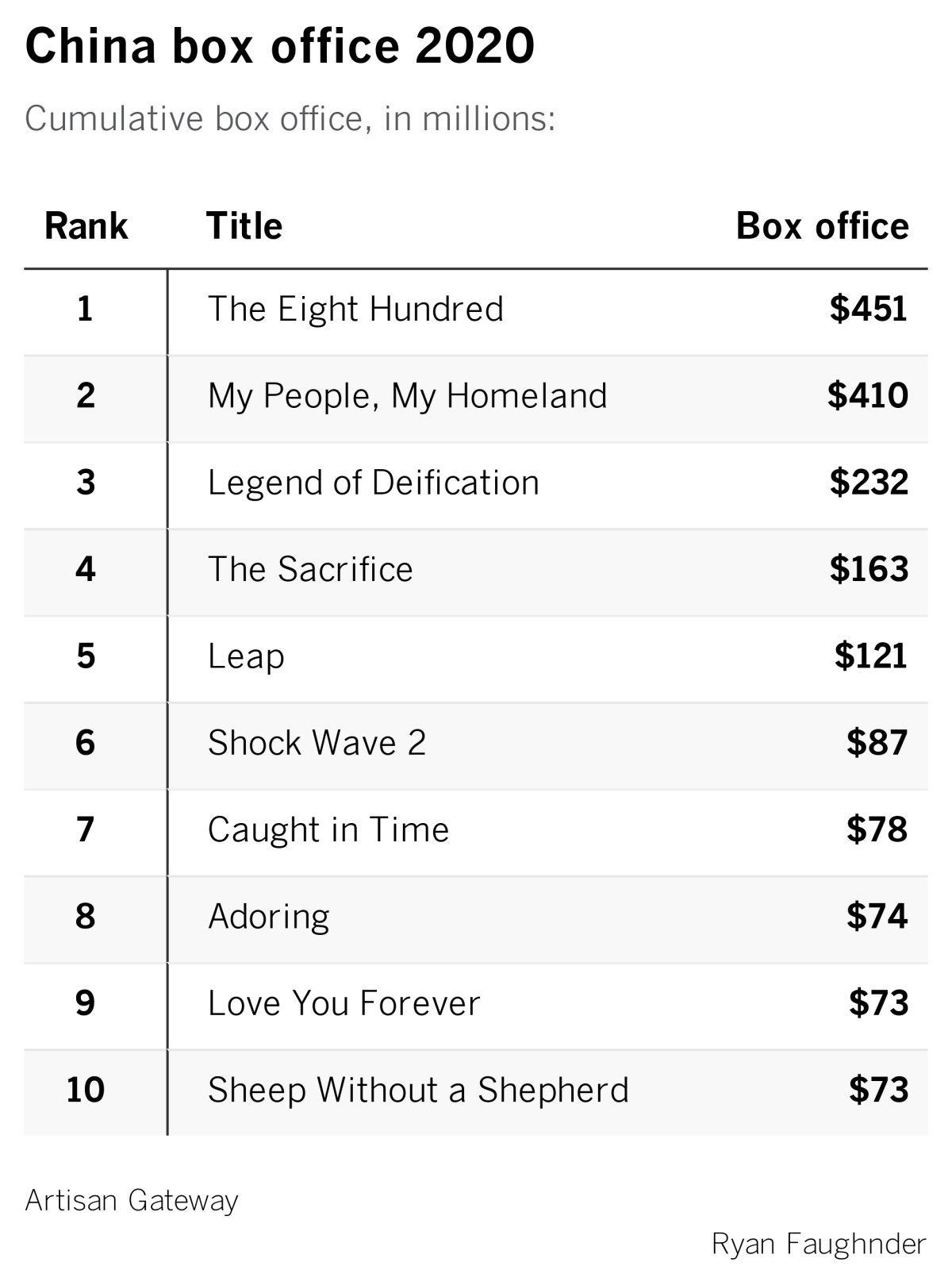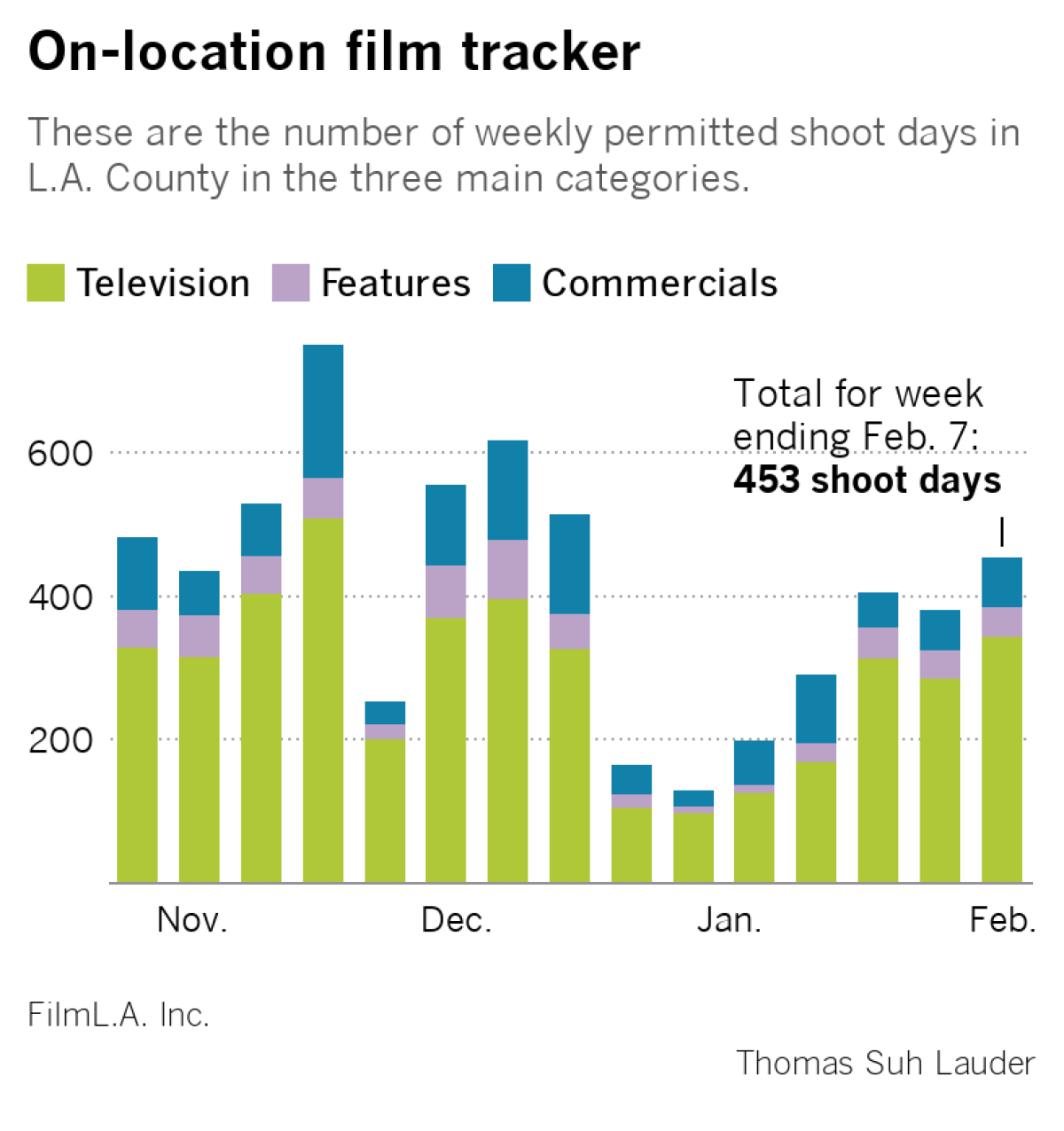The Wide Shot: Hollywood’s China troubles aren’t going away

- Share via
For the last decade or so, Hollywood’s aim in China was to work with Washington and Beijing to expand the industry’s access to the market by opening up the quota for foreign films and making sure its movies got through the censors.
That goal, however, has lost some relevance as the Chinese entertainment market has evolved. The biggest challenge for American studios is no longer whether their films are selected under the revenue-sharing program or avoid getting banned for depicting Winnie the Pooh, according to experts; it’s whether Chinese audiences actually want to see the movies that get in.
Check out the 10 top-grossing productions in Chinese box office for 2020:

The highest-ranked Western import for the year was the Warner Bros. release “Tenet,” at No. 11 in China, with $66 million. This came during a year when China’s annual box office exceeded the U.S. and Canada’s total for the first time, clocking in at $2.7 billion in ticket sales. Receipts in the U.S. and Canada totaled $2.3 billion, down 80% from 2019. Of the more recent releases, Warner’s “Wonder Woman 1984” posted a modest $25 million, while Pixar’s “Soul” did a respectable $52 million.
Inside the business of entertainment
The Wide Shot brings you news, analysis and insights on everything from streaming wars to production — and what it all means for the future.
You may occasionally receive promotional content from the Los Angeles Times.
Several reasons account for the absence of English-language films from China’s top ranks. The pandemic led studios to delay the types of blockbusters that typically do well in China (like MGM’s “No Time to Die”). Additionally, the Trump trade war spurred China’s regulators to clamp down on imports, especially among the indie films that get in under a flat-fee system.
But the virus exacerbated an issue that has been building in the China-Hollywood relationship. China’s film industry is getting good at churning out hits with higher production values, better craftsmanship and big-time support from the Chinese Communist Party, and that is squeezing out English-language blockbusters. In 2019, eight of the top 10 moneymakers in China were domestic productions.
“Quotas are no longer what tamps down Hollywood revenues in China,” said Marc Ganis, president of Jiaflix, a company with deep ties to entertainment and Asia. “It’s the marketplace.”
My colleague Alice Su in Beijing penned a fascinating story about China’s film industry and the “power reversal,” noting that the nation’s government has placed an increased emphasis on locally produced, patriotic cinema to influence audiences at home and project Chinese soft power around the world.
“That reversal of fortunes is no accident,” Su wrote. “It is part of a vision set by China’s leader Xi Jinping, Washington’s most potent adversary, who learned from Hollywood long ago that films are a wellspring of cultural power.”
The audience is also moving from American to domestic content online, choosing to watch local-language variety shows, unscripted programming and dramas instead of foreign films and shows, said Beijing-based David U. Lee, who runs distribution and marketing company Leeding Media.
“Because there’s no new Western content out there, the majority of the Chinese audience has just not thought about Western content that much,” Lee said. “With locally produced content, the quality of production has really risen in recent years, and audiences have really supported it. And that process has accelerated.”
No one is saying they expect the next Marvel or “Fast & Furious” movies to bomb in China when they’re finally released. But having American movies out of sight and thus out of mind for a long time among Chinese audiences could have significant consequences for studios that once seemed to use the country as an ATM.
At the same time, China’s censorship has become less forgiving since Xi moved oversight of the film industry under the country’s propaganda arm. Though U.S. studios have worked hard to avoid running afoul of Chinese sensibilities, the slipups that still happen are illustrative. “Monster Hunter,” a Sony movie co-financed by China’s Tencent, was yanked from theaters after viewers complained about a line that was interpreted as insulting Chinese people, despite vociferous apologies.
Not all companies are avoiding releasing or producing content critical of China. As Steven Zeitchik wrote for the Washington Post, HBO is set to air a documentary critical of the country’s public response to the COVID-19 outbreak.
Still, it’s worth highlighting a key quote in Su’s piece from PEN America research director James Tager, who studies the effect of China’s influence on foreign culture. “Chinese regulators have increasing leverage over Hollywood studios,” he said. “Hollywood needs access to the Chinese market more and more, but China needs access to Hollywood films less and less.”
At the beginning of the modern China-Hollywood relationship around 2012, one of the intangible expected benefits was a cultural exchange: Studios would get a much bigger audience for American entertainment, and China’s film industry would learn Western film techniques and storytelling expertise.
That clearly worked out for China. Ganis told me he wouldn’t be surprised if Chinese films start to account for 75% of the country’s box office annually. Chinese films accounted for 50% to 65% of the nation’s admissions in the years before the pandemic, with the percentage steadily increasing.
It wouldn’t be the first time Hollywood’s quest for profits has boosted the competition. For years, studios were happy to license their content to Netflix. Now, Netflix makes more movies than any of the traditional film companies, and almost all the legacy media giants have chased Netflix into the direct-to-consumer space.
Unlike Netflix, though, China’s film industry has the backing of an authoritarian regime. There was a time when the studios’ biggest worry in China was that the government would use its clout to manipulate the market. A bigger challenge looms if it no longer has to.
The most dangerous GameStop

The GameStop goldrush is on. Like the Thailand cave rescue, the Theranos debacle and the Fyre Festival before it, Wall Street’s Reddit-driven explosion of volatility has become the latest real-life drama to capture filmmakers’ imagination.
Netflix has a project in the works with Mark Boal (“The Hurt Locker”). MGM bought the rights to a forthcoming book by the author of “The Accidental Billionaires,” which became “The Social Network.” On Friday, the trades reported that HBO is working on a series with Andrew Ross Sorkin and Blumhouse. There’s no shortage of angles to explore, from Robinhood’s halting of stock-buying to headband-sporting day trader Keith Gill (a.k.a. Roaring Kitty or DeepF—ingValue).
Even Brett Ratner, who kept a low profile after he was accused by six women of sexual harassment or misconduct in a 2017 Times report (he denied the women’s accounts), is getting into the game by buying the life rights of the guy who founded WallStreetBets, Jaime Rogozinski.
My favorite reaction to the flurry of interest:
Number of the week

Stephen Battaglio on Friday night landed the scoop that Lou Dobbs’ Fox News run was coming to an end. Though the host remains under contract, he is not expected to return to the Fox airwaves. The decision comes rather conspicuously on the heels of the $2.7-billion defamation lawsuit from Smartmatic — the voting software company that former President Trump’s lawyers falsely accused of manipulating vote counts — against Fox News, Dobbs and fellow hosts Maria Bartiromo and Jeanine Pirro.
There are many interesting threads to follow, including the use of defamation law to fight disinformation and the ongoing shifts in Fox’s programming lineup as it tries to fend off competition from Newsmax and others. As Battaglio reported Monday, former U.S. National Economic Council Director Larry Kudlow will move into the Fox Business Network lineup next week, effectively replacing Dobbs.
Look to Battaglio for follow-ups.
CBS fallout
Times Staff Writer Meg James has produced a series of stories detailing allegations of poor treatment of employees at CBS Television Stations, including this recent report on WCBS-TV Channel 2 in New York. In the piece, personnel “alleged that they also worked in a ‘hostile environment’ where Black, Latino, Asian and gay employees were treated poorly, and stories that occurred in Black and Latino neighborhoods were at times overlooked.”
She emails the Wide Shot with the latest on ViacomCBS’ review of the widening situation:
In the wake of the L.A. Times investigation, ViacomCBS hired the high-powered law firm of Proskauer Rose to look into allegations of race and gender discrimination at its TV stations group, which has been led for more than a decade by President Peter Dunn and Senior Vice President David Friend, who oversees news coverage at the 28 television stations that CBS owns. Since 2006, the pair have directly managed WCBS in New York.
But the Jan. 29 selection of Proskauer Rose startled several current and former CBS stations employees. They noted that two decades ago, Proskauer Rose defended CBS stations against allegations of sexism in a landmark case brought by the U.S. Equal Employment Opportunity Commission. CBS ended up paying $8 million to 200 women at six CBS-owned TV stations, including KCBS-TV Channel 2 in Los Angeles, to settle claims of sexual harassment, pay inequities and retaliation. The case began at CBS’ Minneapolis station in 1996.
“Is this law firm the best option to be the investigative body to determine ongoing and current instances of discrimination?” one former CBS stations employee asked in an email.
Proskauer Rose has also defended other entertainment behemoths against claims of discrimination, including the Recording Academy.
To be sure, the partner handling the CBS TV stations investigation, Keisha-Ann Gray, is a respected trial lawyer and a former Assistant U.S. Attorney for the Eastern District of New York who was not with Proskauer Rose two decades earlier when it handled the EEOC case.
ViacomCBS declined to comment. A spokesman for Proskauer did not respond to requests for comment.
Ex-Disney exec’s new Mojo
Former Disney-ABC Television Group President Ben Sherwood’s new app venture, dubbed Mojo, launches today with a mission to help parents manage their kids’ sports teams.
Mojo uses short-form video to help grown-ups coach youth sports and is backed by Los Angeles-based V.C. Alpha Edison and folks including Seattle Seahawks star Russell Wilson and U.S. women’s soccer players Julie Foudy and Brandi Chastain. The app, which has a free version and a subscription plan that costs $19.99 a year, is targeting the market for youth sports played by kids 4-13, which Sherwood says amounts to 50 million kids in the U.S. and 500 million worldwide.
Sherwood came up with the idea for the Santa Monica-based startup while scouring the web for help coaching his two boys in team sports, including baseball and flag football.
“We think youth sports is broken right now; families are priced out, burned out by the current system, and the pandemic has made that all worse,” Sherwood said. “Our view is youth sports are broken because the professionalization of youth sports with travel teams and league teams has created a divide between the 1% who can afford it and the 99% who love sports but don’t have the elite ability and certainly don’t have the resources.”
L.A. production
Shoot days in the Los Angeles region picked up last week after a brief dip as productions continue to recover from shutdowns, with television and commercial activity increased from the prior week, according to the latest data from FilmLA. Late last month, unions and a group representing commercial advertisers and advertising agencies agreed to lift a halt to commercial productions.

More top stories
— WME has finally ended its standoff with the Writers Guild of America. Under the agreement, Endeavor and its investor Silver Lake will reduce their ownership stake in Endeavor Content to 20% or lower, similar to a deal reached by major agency CAA.
— Universal Music Group is pulling its artists’ songs from Ryan Kavanaugh-owned video app Triller amid a dispute over musicians’ pay. On Monday, much larger rival TikTok and UMG announced a deal for an “expanded global alliance.”
— The Bulwark’s Across the Movie Aisle podcast is worthwhile listening, on the collision of art and politics. This episode features a strong discussion of Variety’s highly unusual decision to apologize for a review of “Promising Young Woman” after the film’s star complained publicly.
— If you haven’t yet read NYT’s feature, Vast Web of Vengeance, it’s definitely worth checking out for an illustration of how difficult it can be to scrub the web of false and damaging information.
— Also, I loved this piece by Randall Roberts on the complicated relationship between Cicely Tyson, who recently died, and Miles Davis, which features priceless anecdotes culled from both their autobiographies.
On the calendar
Walt Disney Co. reports first-quarter earnings Thursday after the market closes.
Finally ... the Wide Bot
HBO’s documentary “Fake Famous,” about the dark side of influencer culture, could have gone very wrong with its fairly straight-faced message that fame isn’t all it’s cracked up to be and much of what you see on social media is inauthentic.
But it turns out to be a highly entertaining look at the faux reality of digital semi-stardom, following journalist Nick Bilton’s experiment in which he tries to turn three relative online nobodies into Instagram royalty.
It’s not just the fact that the fakery exists or how pervasive it is; it’s the level of specific chicanery these people will put themselves through for likes (wait ‘til you see what they do with a toilet seat).
So if you’re enjoying the Wide Shot, tell your friends. If you don’t, I’m going bot-shopping!
Inside the business of entertainment
The Wide Shot brings you news, analysis and insights on everything from streaming wars to production — and what it all means for the future.
You may occasionally receive promotional content from the Los Angeles Times.




